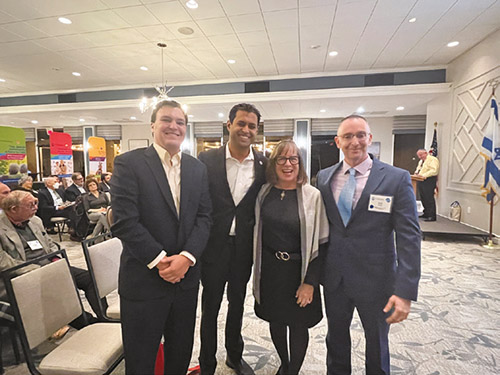
In light of the shocking rise in antisemitism in recent years, bills that would strengthen Holocaust and genocide education in New Jersey schools are being considered by the state Legislature.
The Senate bill’s primary sponsor is Sen. Vin Gopal (D-11), who introduced it after consultation with leaders of the Jewish Federation in the Heart of New Jersey. It was approved by the Senate Education Committee on December 1 and is being co-sponsored by Senators Patrick Diegnan Jr. (D-18), Robert Singer (R-30) and Andrew Zwicker (D-16).
An identical companion Assembly bill’s primary sponsors are Gary Schaer (D-26), Lisa Swain (D-38) and Robert Karabinchak (D-18). It has six co-sponsors and is expected to be taken up by that education committee in January.

Gopal, a lifelong Monmouth County resident and chair of the Senate’s Education Committee, came to the Federation’s annual meeting December 8 to speak about his reasons for championing the bill.
“Over time the Holocaust has become less and less real,” he said, adding that during visits to his grandparents in India he would make a point of stopping at a Holocaust site in Europe on the return trip. “It’s important that everyone understands the horror of the Holocaust.”
Antisemitic incidents rose to all all-time high nationally in 2021, according to the Anti-Defamation League’s annual audit, with a total 2,717 reported incidents of assault, harassment and vandalism representing a 34% increase over the previous year, with New Jersey recording the second highest rate in the country.
A 2020 survey on Holocaust knowledge and awareness among millennials and those in Gen Z by the Conference on Jewish Material Claims Against Germany found that 63% of all national survey respondents didn’t know that 6 million Jews were murdered, and 36% thought that 2 million or fewer Jews were killed during the Holocaust. It also found that 48%couldn’t name a single concentration camp or ghetto. The state-by-state analysis found New Jersey’s youth knowledge to be somewhere in the middle of the pack.
Although in 1994 New Jersey became the first state in the nation to require Holocaust education, there has never been any standardized curriculum, leaving each district to come up with its own teaching plan.
Amy Mallet, a member of the Federation’s governing council, said that has resulted in a wide variance of curriculums. “There are more than 500 districts in New Jersey,” said the Tinton Falls resident. “Some do a very good job, but others offer it at the end of the semester with no continuation, and others offer it as an elective where students can opt out completely.”
As a former member of the Monmouth County Board of Freeholders, now the board of commissioners, Mallet became friendly with Gopal through political circles and reached out to him knowing his concern about such issues. “We need core texts and curriculum so that every child understands what happened and so it never happens again,” said Gopal.
Dan Rozett, the Federation’s manager of community relations and Israel engagement, said he had brought up the issue of the uneven curriculums about a year ago at a meeting of the Federation’s Jewish Community Relations Committee (JCRC).
“I wanted to do something,” Rozett told The Jewish Link. With Mallet providing the connection, he arranged a meeting with Gopal, the JCRC and teachers from both public and Jewish schools. The group told the senator what they believed needed to be done to improve Holocaust and genocide education.
“Our federation not only initiated the bill but we also provided feedback on the language of the bill to Senator Gopal,” said Rozett.
He also said he found a survey that was developed by New York State that required all state school superintendents to attest that their districts are teaching about the Holocaust appropriately as part of classroom instruction aligned with the state learning standards and education law. The survey requirement was signed into law by Gov. Kathy Hochul in August.
The New Jersey bill would require within 60 days of the date of the act’s passage that the state Commissioner of Education develop and distribute a survey focusing on determining how each district is meeting the Holocaust and genocide requirement. The superintendents will have 30 days to complete the survey; 180 days after passage the commissioner will be required to submit a report to the governor and Legislature with the results and any needed recommendations to strengthen the mandate. The bill will also give the commissioner authority to require corrective action for any district found to not be fulfilling the requirement.
Rozett testified before the Senate Education Committee at the hearing on December 1, as did Alana Burman, director of the Jewish Community Relations Committee of the Jewish Federation of Northern New Jersey, representing the Jewish Federations of New Jersey.
“This is something that is very much needed in our state,” said Burman. “We need to take inventory of what and how the Holocaust and genocides are being taught, with the intention of building on what exists. I hope this will result in better and stronger anti-hate and Holocaust curriculum and students who better understand and can convey it themselves.”
Rozett said he envisioned the bill as a first step to providing more meaningful and comprehensive Holocaust and genocide education. The bill must next be approved by the Senate’s Budget and Appropriations Committee.










